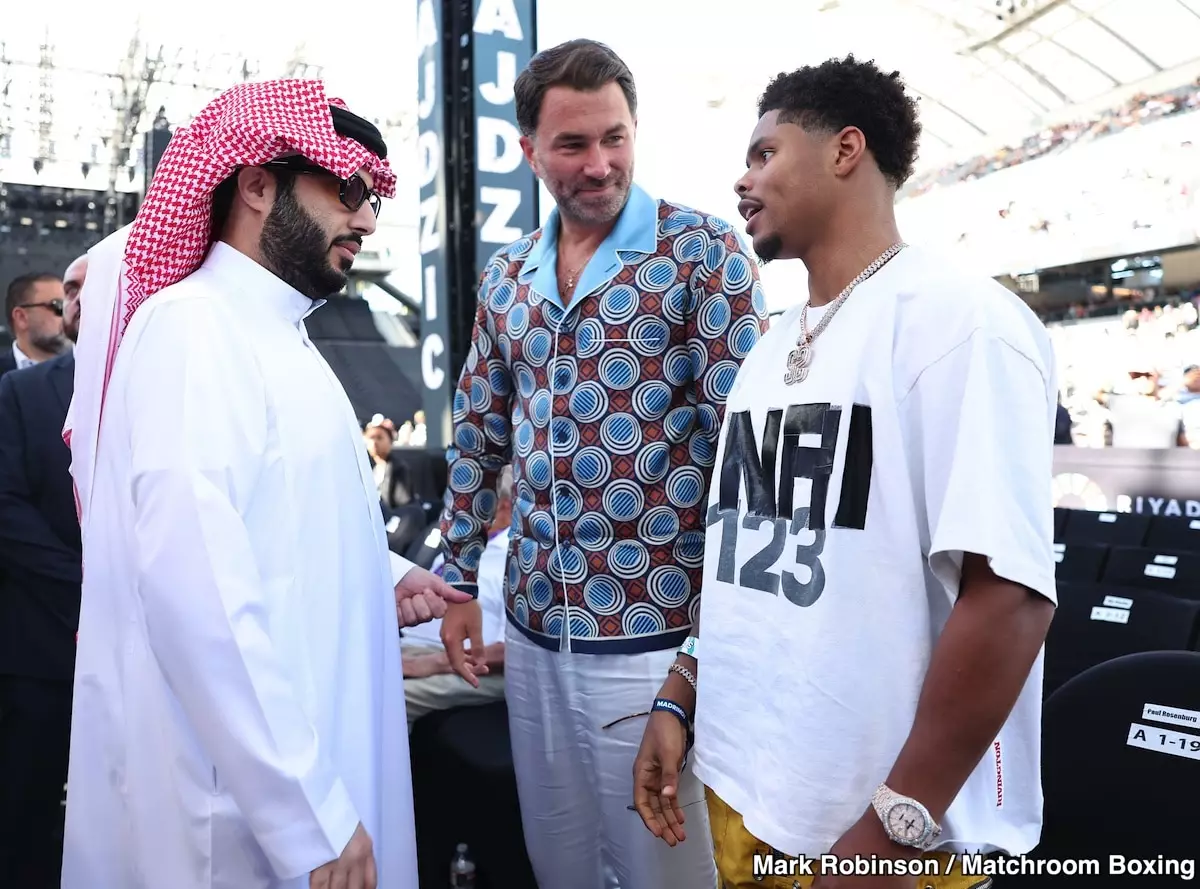In the world of boxing, match-ups often stir excitement among fans, but few have garnered as much attention as the anticipated clash between WBC lightweight champion Shakur Stevenson and rising contender Floyd “Kid Austin” Schofield Jr. Set against the backdrop of Saudi Arabia’s Riyadh Season event on February 22, this fight is poised to be a defining moment not just for the fighters, but for the sport itself. Floyd Schofield Sr.’s recent claims of a “done deal” have sparked discussions about the potential repercussions of this bout, with contrasting views emerging about the fighters’ capabilities and preparations.
While Shakur Stevenson boasted an impressive record of 22 wins, 0 losses, and 10 knockouts, Schofield Jr.’s path to this title shot has been under scrutiny. Critics argue that his journey has not followed the conventional route, marked instead by a series of less challenging fights against opponents who have not posed significant threats. This raises pivotal questions regarding Schofield’s readiness for a fighter like Stevenson, who has been tested against formidable opponents in the ring.
It is essential to consider the ramifications of Schofield’s boxing strategy and record leading up to this fight. With a history of facing lesser competitors, there is an inherent risk in stepping into the ring with Stevenson—a fighter renowned for his skill set, tactical acumen, and power. The sheer gap in experience raises eyebrows, especially as Fans and analysts alike reflect on whether Schofield’s self-confidence, as echoed by his father, can truly translate into a competitive performance.
From prevailing sentiments in the boxing community, there is a palpable sense of bias towards Shakur Stevenson as the overwhelming favorite. Many speculate that Floyd Sr. and Schofield are desperate to seize a title opportunity, perhaps too rapidly given Schofield’s prior performances. This perspective bears weight; indeed, if Schofield’s last outing is any indicator, where he was taken down a notch by a lesser-known opponent, stepping up to Stevenson may prove daunting.
Floyd Sr. expresses optimism, suggesting that Kid Austin could produce an upset, citing the potential for a knockout as an avenue to victory. His assertions tap into an age-old narrative in boxing—that a fighter can dramatically change their fate in one pivotal moment. Yet, one cannot help but question whether this blind faith can obscure the glaring truth of Schofield’s vulnerabilities and the experience gap between the two fighters.
The dynamics at play surrounding this fight will test not only Schofield’s boxing abilities but his mental fortitude. With Floyd Sr. remarking about the character-building experience that could come from this fight—regardless of the outcome—Schofield Jr. faces the pressure of expectations from the boxing audience and his family name. This fight is not merely about reclaiming pride; it is an opportunity to elevate his standing or risk falling short of a legacy that his father envisions for him.
Additionally, the presence of marquee fights on the Riyadh card, including the rematch between Artur Beterbiev and Dmitry Bivol, will cast a further spotlight on the Stevenson-Schofield matchup. Viewers will not only be focusing on the qualitative performance but also how each fight may shape narratives for both upcoming and established fighters.
Ultimately, what remains paramount in any combat sport is the growth that comes from experience, whether through victory or defeat. Floyd Sr. optimistically draws parallels with Canelo Alvarez’s trajectory post-defeat to Floyd Mayweather Jr., although it is crucial to recognize the distinctions in their respective careers at similar age points. Canelo was already displaying significant prowess against noteworthy opposition, a contrast to Schofield’s relative inexperience.
Should Schofield encounter defeat at the hands of Stevenson, it can indeed serve as a catalyst for learning. The boxing fraternity constantly evolves, where monitors of talent like Schofield must navigate mazes of skill, toughness, and mental resilience. The outcome of this fight, while possibly disheartening, could initiate a process of recalibration for Schofield—a resetting of goals, training regimens, and strategies—ideal for a fighter seeking to compose a more fruitful legacy in the ring.
As anticipation builds for the showdown on February 22, the Shakur Stevenson vs. Floyd Schofield Jr. fight serves as a poignant reminder of boxing’s unpredictable nature. In a sport that epitomizes resilience and adaptation, the bout promises not merely to be an event—a flashpoint where aspirations collide with reality. Whether fans will witness a clear domination or an astounding upset remains to be seen, but the dialogues leading up to this pivotal moment are in themselves an integral part of the sport’s ongoing narrative.

